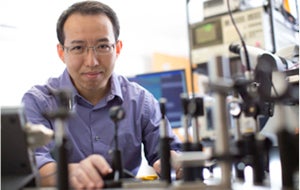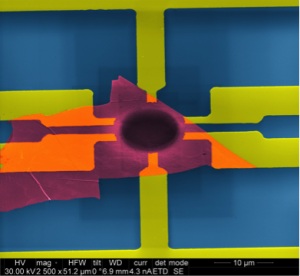 Philip Feng, assistant professor of electrical engineering and computer science, has won a $500,000 National Science Foundation (NSF) Faculty Early Career Development Award for his five-year project, “Dynamically Tuning 2D Semiconducting Crystals and Heterostructures for Atomically-Thin Signal Processing Devices and Systems.”
Called a CAREER award, it’s the NSF’s most prestigious grant to junior faculty members. Winners are chosen because they exemplify the role of researcher-teacher-scholar through outstanding research, excellent education and the integration of the two.
Feng’s CAREER project is focused on understanding the device fundamentals and engineering principles of two-dimensional (2-D) semiconducting crystals and heterostructures made of stacks of various 2-D semiconductors.
The research will help lay a foundation for developing atomically thin signal processing devices and systems with new features that may not be accessible with devices based on conventional 3-D semiconductor crystals. The features include ultralow power consumption, novel radio-frequency signal transduction and sensing schemes, and more.
Philip Feng, assistant professor of electrical engineering and computer science, has won a $500,000 National Science Foundation (NSF) Faculty Early Career Development Award for his five-year project, “Dynamically Tuning 2D Semiconducting Crystals and Heterostructures for Atomically-Thin Signal Processing Devices and Systems.”
Called a CAREER award, it’s the NSF’s most prestigious grant to junior faculty members. Winners are chosen because they exemplify the role of researcher-teacher-scholar through outstanding research, excellent education and the integration of the two.
Feng’s CAREER project is focused on understanding the device fundamentals and engineering principles of two-dimensional (2-D) semiconducting crystals and heterostructures made of stacks of various 2-D semiconductors.
The research will help lay a foundation for developing atomically thin signal processing devices and systems with new features that may not be accessible with devices based on conventional 3-D semiconductor crystals. The features include ultralow power consumption, novel radio-frequency signal transduction and sensing schemes, and more.


